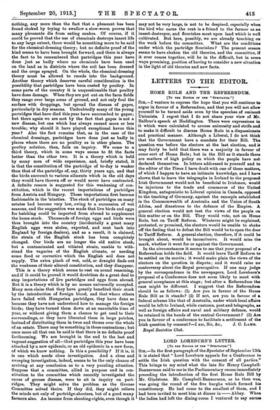LETTERS TO THE EDITOR.
HOME RULE AND THE REFERENDUM.
[To THE EDITOR OF THE " SPECTATOR...1
Sts,—I venture to express the hope that you will continue to argue in favour of a Referendum, and that you will not allow yourself to be turned aside even by the speeches of eminent Unionists. I regret that I do not share your view of Mr. Balfour's speech at Haddington. There were expressions in it which were calculated to arouse animosity and strife and to make it difficult to discuss Home Rule in a dispassionate and practical manner. Although a Liberal, I do not think that the Government have a mandate for their Bill. The question was before the electors at the last election, and it may fairly he held that there was a majority in favour of some sort of Home Rule ; but in the Bill as it stands there are matters of high policy on which the people have not declared themselves. In letters addressed to yourself and to the editor of the Times I have dealt with one of these matters, of which I happen to have an intimate knowledge, and I have shown that to leave the telegraphs in Ireland to the proposed Irish Government would not be beneficial to Irishmen, would be injurious to the trade and commerce of the United Kingdom, antagonistic to Liberal opinion in Canada, opposed to the teaching of Germany, against the example established in the Commonwealth of Australia and the Union of South Africa, and disastrous to the defence of the Empire. A general election would not test the views of the people on this matter or on the Bill. They would vote, not on Home Rule, but on Tariff Reform. Whatever might be explained, protested, or promised, the electors would be unable to shake off the feeling that to defeat the Bill would be to open the door to Tariff Reform. A general election, therefore, if it could be brought about, would be inconclusive. It would miss the mark, whether it went for or against the Government.
In the circumstances it seems to me that your proposal of a Referendum holds the field. It would leave Tariff Reform to be settled on its merits ; it would make plain the views of the electors on the question in dispute ; and it would raise no controversy about the Royal prerogative. If one may judge by the correspondence in the newspapers, Lord Loreburn's proposal of a Conference does not seem likely to meet with general acceptance at this stage ; but after a Referendum the case might be different. I suggest that the Referendum should be as follows : (1) Are you in favour of the Home Rule Bill as it stands ? (2) If not, are you in favour of a federal scheme like that of Australia, under which local affairs would be left to Ireland, while customs, post and telegraphs, as well as foreign affairs and naval and military defence, would be retained in the hands of the central Government ? (3) Are you in favour of a conference to facilitate a settlement of the
Irish question by consent P—I am, Sir, &c., J. C. Lax% Royal Societies Club.










































 Previous page
Previous page